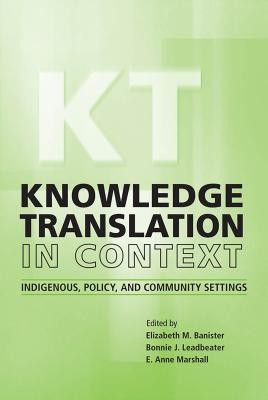
- We will send in 10–14 business days.
- Publisher: University of Toronto Press
- Year: 2019
- Pages: 216
- ISBN-10: 1487524730
- ISBN-13: 9781487524739
- Format: 15.2 x 22.9 x 1.3 cm, softcover
- Language: English
- SAVE -10% with code: EXTRA
Knowledge Translation in Context (e-book) (used book) | bookbook.eu
Reviews
Description
The main goal of knowledge translation (KT) is to ensure that diverse communities benefit from academic research results through improved social and health outcomes. But despite growing interest in researcher-user collaborations, little is known about what makes or breaks these types of relationships. Knowledge Translation in Context is an essential tool for researchers to learn how to be effective partners in the KT process.
Drawing on expertise and studies from across the globe, Elizabeth Banister, Bonnie Leadbeater, and Anne Marshall outline a variety of perspectives on KT processes. Case studies outline the uses of KT in many contexts, including community, policy, Indigenous, and non-profit organizations. While recognizing the specificity of each situation, Knowledge Translation in Context highlights the most important elements that have led KT to succeed (or fail) as a dynamic, multidirectional process.
EXTRA 10 % discount with code: EXTRA
The promotion ends in 17d.11:56:34
The discount code is valid when purchasing from 10 €. Discounts do not stack.
- Publisher: University of Toronto Press
- Year: 2019
- Pages: 216
- ISBN-10: 1487524730
- ISBN-13: 9781487524739
- Format: 15.2 x 22.9 x 1.3 cm, softcover
- Language: English English
The main goal of knowledge translation (KT) is to ensure that diverse communities benefit from academic research results through improved social and health outcomes. But despite growing interest in researcher-user collaborations, little is known about what makes or breaks these types of relationships. Knowledge Translation in Context is an essential tool for researchers to learn how to be effective partners in the KT process.
Drawing on expertise and studies from across the globe, Elizabeth Banister, Bonnie Leadbeater, and Anne Marshall outline a variety of perspectives on KT processes. Case studies outline the uses of KT in many contexts, including community, policy, Indigenous, and non-profit organizations. While recognizing the specificity of each situation, Knowledge Translation in Context highlights the most important elements that have led KT to succeed (or fail) as a dynamic, multidirectional process.


Reviews